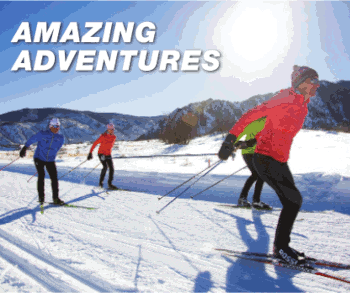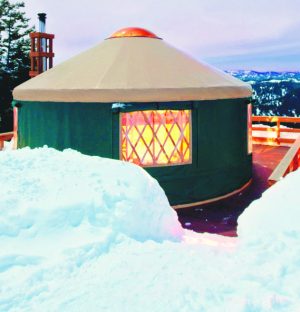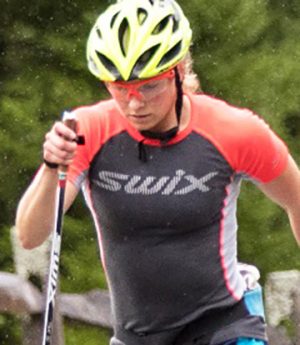April 21, 2008 (Anchorage, Alaska) – Talkeetna, Alaska’s Tazlina Mannix began skiing as soon as she could walk. At age five she began using it as a mode of transport to and from the bus stop. Since then she has been using that mode of transport to record ski racing wins across the continent.
Mannix made some major progress a year ago in making a bid for World Cup racing. She won two U.S. titles, won a Continental Cup race in Slovenia and had top-10 and top-15 results at the Under-23 World Championships. This past season after returning from an appendectomy in the early fall, Mannix recorded an 8th place finish in the 15km mass start skate race at the 2008 Under-23 World Championships.
You had your appendix out in the late summer early fall and yet on all accounts had quite a successful season. Tell us about what happened and how long it took you to get back to normal?
Tazlina Mannix: I had an appendectomy in late fall – at the end of August, beginning of September. Training was going really well, I had just attended a camp on the Eagle Glacier, and then, all the sudden, I was in for emergency surgery. Normally the laparoscopic operation takes two weeks to recover from, but unfortunately I had some complications and the doctor had to perform a more invasive procedure after the laparoscopic surgery didn’t work. Needless to say, I ended up having more like a six-week recovery time, although in many respects in was longer than that, because I was nervous about how much to use my core after it was all said and done. The hardest part was that your core is engaged whenever you move, so it’s pretty hard to be active after having abdominal surgery. The biggest risk was for a hernia, which would have prolonged my recovery, so basically I had to be really careful to let everything heal properly.
What were your training hour goals before the incident and what did they end up being?
TM: My goal was for 700 hours this year, and if I hadn’t had surgery, I would have been right on. I’ll end up at about 650, similar to last year, because I lost a substantial amount of training due to the operation. Also, the training was less specific to skiing for a long time, because I was only able to road bike for several weeks post-op.
What did you learn as an athlete from the experience that you feel would be useful for other athletes to know?
TM: The biggest lesson I took away from this was that when you’re injured the most important thing is to mentally relax and do all you can to enjoy the rest. I was a terrible example of this. I was so antsy to move, even when I was in the hospital recovering, I feel like I wasted a lot of energy being frustrated, mad, and anxious. I think you heal faster when you are positive and relaxed and don’t rush into things. Luckily I didn’t get a hernia from doing too much too soon, but I certainly was a candidate for that type of complication. If/when I’m sidelined again, I hope I remember this and really just appreciate the down time.
Do you feel you missed out on anything in the race season as a result of time off?
TM: I had a harder season this year than in years past, and I think it was due to the appendectomy. I was sick a lot, and I think my immune system was weak because of the stress on my body. I also feel that the time off from training followed by an aggressive push to get me back in shape after I was well had something to do with a suppressed immune system. In addition to this, I wasn’t able to follow an ideal training progression to prepare for the race season because I had such a long, unanticipated break. As a result my performance was up and down, because I kept getting sick, had a harder time handling bigger training loads, and was often not in top form.
You are currently a part-time student at Alaska Pacific University in Anchorage. Did you ever consider pursuing your education at a NCAA program?
TM: I considered attending Middlebury College, because I really liked the school and the educational opportunities there. In terms of skiing, I knew I wasn’t interested in the NCAA system, because I wanted more leniency and flexibility in a ski program. The draw of the NCAA schools was not the skiing, but the education. Ultimately I chose skiing over full-time academics, and when I decided on this, it was evident that a non-NCAA program was best for me as a developing athlete.
At the U23 Nordic Worlds you had some great results. I understand that with a kilometer to go in the mass start skate race you were in position to medal?
TM: The U-23 15km freestyle race was definitely one of the highlights of the season, and at the same time, it was definitely the biggest disappointment. It was one of the few races this season that I felt like my old self. My body was fresh and skiing felt relatively effortless. What was also exciting was that I was skiing with two of my teammates, Morgan Arritola and Liz Stephen, and we were all feeling really strong. It was pretty exhilarating, because we were in a pack (or were dropping) women who are racing in the top 30 and top 10 on the World Cup. Unfortunately with less than 1km to go, when the three of us were in 2nd, 3rd, and 4th, Morgan and I were involved in a crash and were passed by the pack that was chasing us. It was downhill from there to the finish, and we would have had the podium wrapped up, but after the crash there was no hope of catching the women who had passed us. What was great was that Liz managed to avoid the pileup and finished third, and Morgan and I were less than 10 seconds out of second place. It was bittersweet, but it was the best points race of my life thus far, and I improved on my previous best U23 finish, placing 8th overall.
How exciting is it to be a part of the surge in US women’s distance skiing?
TM: It’s so fun to have such fast teammates in Morgan and Liz. We push each other and mix it up in races. We’re competitive, but we’re also really good friends and training partners. Skiing is an individual sport, but the team component is super important. As a group we make each other better. They’re committed, and it’s because of this that we’re going to help each other get to the next level. I know someday we’re going to be a force, and it makes it more fun when you’re a force of three rather than a force of one!
Top News Stories
Interview with USST Member Tazlina Mannix
by Jeff EllisLeave a Reply
You must be logged in to post a comment.






![National camp action [P]...](https://skitrax.com/wp-content/uploads/2019/08/Duluth-4-2019-08-08-at-10.46.51-AM-300x246.png)
![Matt Liebsch on the CXC Elite Team [P] CXC...](https://skitrax.com/wp-content/uploads/2019/08/Matt-Liebsch-CXC.2-525x700.4-300x267.jpg)
![Dan LaBlanc [P]...](https://skitrax.com/wp-content/uploads/2019/08/Dan-LaBlanc-img_1855.3.jpg)

![Alaska's Tazlina Mannix (USST) at the Alberta World Cup in Canmore.[P]Pam Doyle](http://skitrax.com/skitrax22/images/skitrax/480d16a23a98eUS Tazlina Mannix doyle.2.jpg)